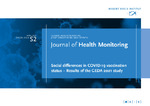Social differences in COVID-19 vaccination status – Results of the GEDA 2021 study
Bartig, Susanne
Müters, Stephan
Hoebel, Jens
Schmid-Küpke, Nora Katharina
Allen, Jennifer
Hövener, Claudia
Background: The COVID-19 vaccination is a key measure to contain the pandemic. It aims to restrict new infections and to reduce severe courses of the disease. This paper examines the influence of various social determinants on COVID-19 vaccination status.
Methods: The analyses are based on data from the study German Health Update (GEDA 2021), a nationwide telephone-based survey of the adult population in Germany, which was conducted between July and December 2021. In addition to bivariate analyses, the association between the COVID-19 vaccination status and the social determinants was examined using Poisson regression.
Results: A total of 86.7% of people aged 18 years and older who participated in GEDA 2021 have been received at least one dose of COVID-19 vaccine. Social differences are evident: The proportion of people vaccinated against COVID-19 increases with age, income and higher education group. Lower vaccination rates are found among people with a history of migration, people living in rural areas and people from East Germany. An age-differentiated analysis shows that the social differences in COVID-19 vaccination uptake are lower among those aged 60 years and older.
Conclusions: The presented results should be considered when designing targeted interventions to overcome potential barriers to COVID-19 vaccination uptake. Further research is needed regarding the explanatory factors for the social differences in vaccination behaviour, such as structural and group-specific barriers or psychological determinants.
Files in this item

